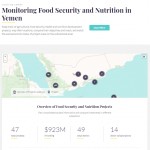Frank Place and Peter Hazel, IFPRI
It is often argued that the more researchers engage with policymakers, the more likely that their evidence will be used in policy decisions; also, that engagement is enhanced when researchers reside in the countries where they are conducting research. These notions were put to the test in a recent set of studies that examined the contributions of IFPRI’s decentralization strategy, and in particular its country programs (CPs), to policy outcomes and subsequent impacts. Source: IFPRI Egypt Country Office


